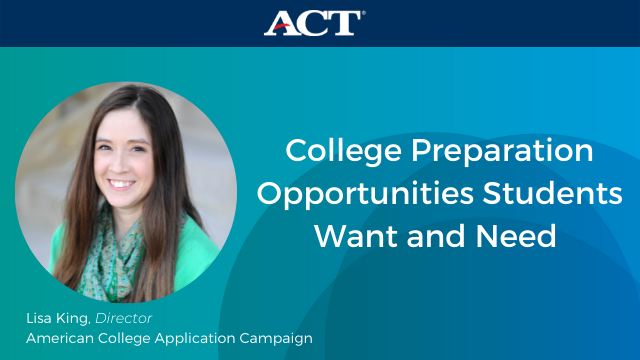By: Lisa King, director, American College Application Campaign
Though the pandemic has brought unprecedented challenges to both K-12 and higher education, there are lessons we can learn on the importance of college preparation activities and how students and families experience the college-going process. On Feb. 24, ACT released "College Preparation Opportunities, the Pandemic, and Student Preparedness: Perspectives From Class of 2021 College-Bound ACT Test-Takers," new research that highlights student experiences and provides insight into the types of college preparation activities students engaged in during the pandemic, and how prepared they feel for life after high school.
In May of last year, ACT surveyed high school seniors who took the ACT test between September 2020 and June 2021. Most college-bound students from the class of 2021 were engaged in college preparation opportunities, but disparities existed in who engaged in those opportunities and the extent of the engagement. As the director of a national college preparation program, I was particularly struck by a few elements.
- Where there was an increase in exposure to in-person learning, the likelihood of participating in college preparation activities increased.
- Taking college-credit courses increased the chance of participation in college preparation activities.
- Students who engaged in college preparation activities showed higher levels of non-academic self-reported preparedness.
- Engaging in college preparation activities in which students were able to talk with a knowledgeable adult about college was associated with lower levels of financial concerns among students from low-income families.
Unfortunately, not all schools were able to consistently offer college preparation activities to all students. Students told us that 44% of them had been learning mostly or exclusively in person, 36% learned mostly or exclusively online, and 20% had a mix of in-person and online. Additionally, students from low-income families, Hispanic/Latino students, and Asian students were more likely to report higher numbers of college preparation activities that were disrupted by the pandemic.
As we continue to see the effects of the pandemic and other traditional barriers to students navigating the college-going process, this means that college preparation efforts like the American College Application Campaign that empower the college-going process are more important than ever. An initiative of ACT’s Center for Equity in Learning, our campaign has achieved much of its success over the years through the in-person, school-day model with trusted adults including school staff and community volunteers guiding students through the application process. This model eliminates barriers that could otherwise prevent students from completing an application, such as a lack of internet access, afterschool responsibilities, and transportation issues that prevent the student from attending evening or weekend activities, or access to a supportive adult who understands the application.
The research findings show support for coordinated college application efforts at the school and state levels, as application campaign events are providing students with what they need to be successful and feel prepared for the college-going process. But we must be willing to adjust how we reach and serve all students and take the time to understand their concerns.
In the new brief, ACT provides the following recommendations.
- Provide personalized support based on student concerns: High schools should first collect information about students’ concerns to understand which college preparation activities to provide each year.
- Ensure students are aware of the available opportunities and their benefits: Once the school understands the unique needs and concerns of their student population, make sure that students of all groups have the same access to college preparation opportunities.
- Incorporate relevant topics in college preparation opportunities: Students want personalized support on topics beyond the steps for completing a college application or the FAFSA. Student-suggested topics include time management, career navigation, and development of life skills.
- Provide school-day activities with trusted adults: Students want more engagement opportunities during the school day with trusted adults. Activities like college application completion events give students dedicated time during the school day to ask questions and receive support through a major college-going milestone.
- Promote equity using virtual college preparation opportunities: We need to build flexibility within our college preparation activities to reach students where they are. This may mean continuing virtual formats while also providing in-person supports.
The American College Application Campaign is currently working with San Diego State University’s Center for Equity and Postsecondary Attainment through the COVID-19 Enrollment and Persistence Strategy Grant, funded by a grant from The Kresge Foundation, to address both school counseling and college advising practices that are responsive to student needs based on current student and family feedback.
As educators and policymakers, we can and must do better to support all students in the college preparation process. If students do not have access to college preparation activities, they could veer from their college-going path. Now is the time to ensure that students are supported so they don’t become discouraged and find their way to a successful postsecondary and career experience.
